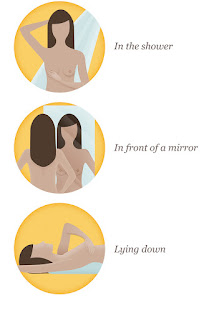- About 1 in 8 U.S. women (about 12%) will develop invasive breast cancer over the course of her lifetime.
- In 2015, an estimated 231,840 new cases of invasive breast cancer are expected to be diagnosed in women in the U.S., along with 60,290 new cases of non-invasive breast cancer.
- About 40,290 women in the U.S. are expected to die in 2015 from breast cancer, though death rates have been decreasing since 1989.
- Besides skin cancer, breast cancer is the most commonly diagnosed cancer among American women.
- Gender: Although men can develop breast cancer, it is more common in women.
- Age: The risk of developing breast or ovarian cancer increases as you age.
- Genetics: Your risk of developing breast or ovarian cancer doubles if your mother, sister, or daughter has had either types of these cancers.
There are multiple ways to perform a self examination. Please see the instructions provided below for each technique.
- Put your right arm behind your head and with your left hand check your right breast for lumps or thickenings.
- Choose 1 of the 3 patterns. With the fingers of your left hand, apply 3 levels of pressure--light, medium and firm--in overlapping, dime sized, circular motions to feel entire breast tissue, including underarm. Examine the underarm with your arm only slightly raised.
- Put your left arm behind your head and repeat steps with your right hand on the left breast and underarm. Also, look in a mirror for changes in shape, size, or skin texture of breast. Check the nipples for changes, including unusual discharge.

Laying Down:
To examine your right breast, place your right hand behind your head. Follow the same technique as in the shower. Check for lumps, knots, or thickenings. Then put your left arm behind your head, and repeat with your right hand.
Before A Mirror:
With hands firmly pressing down on hips, check for changes in shape, size, or texture of your breasts.
If you feel as though you need to see a medical provider, contact EIU Health Service at (217) 581-3013, visit www.eiu.edu/health, or stop by the Human Services building and see an Appointment Clerk to set up a visit.


No comments:
Post a Comment